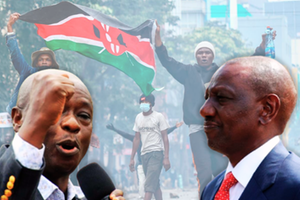In scramble for influence in Africa, India avoids China’s mistakes

Indian Prime Minister Narendra Modi (left) and Chinese President Xi Jinping. PHOTO | FILE | AFP
What you need to know:
- While India trails the Asian giant in terms of infrastructure investment in Africa, the country doesn’t carry the perception burden that China has.
The rivalry between the US and China over their influence in Africa have played out in public, as each claims to be the continent's biggest supporter.
Just last week, US Secretary of State Mike Pompeo claimed that China's recent medical aid to Africa was a conditional gesture, warning that many of the items donated to the continent have malfunctioned.
In a press briefing with foreign journalists on Thursday last week, Mr Pompeo said only the US has sacrificed “true blood” on the continent, arguing his country feels sad at Africa being shortchanged.
“When it comes to economic development, we watch China – and Russia to a lesser degree – but China deploy their economic toolkit. I think the world’s gotten onto it, frankly.
China has also been criticised for using infrastructure projects to load poor countries with debt.
However, amid all this, some experts reckon that an unlikely player -- India -- may emerge as the ultimate but silent beneficiary of this tiff.
PERCEPTION BURDEN
While India trails the Asian giant in terms of infrastructure investment in Africa, the country doesn’t carry the perception burden that China has.
“Although India and Africa’s economic relations are modest compared to China, India has numerous advantages, including proximity, a common language, popularity of Indian culture, and the appeal of democracy,” argued Abishek Mishra, a Junior Fellow at Indian policy think-tank Observer Research Foundation (ORF).
“Indian engagement lays emphasis on long-term – enhancing Africa’s productive capacity, diversifying skills and knowledge, and investing in small and medium-sized enterprises.”
ALTERNATIVE PARTNER
Some experts think India could benefit from the Covid-19 fiasco by presenting itself as a third alternative partner.
“India can compete with China in two ways. First, it can work to enable greater African agency, while pursuing its interests, and, second, India can pursue greater engagement with its long-established and well-integrated diaspora community in Africa,” Christian Kurzydlowski, a geopolitical researcher argued in the Diplomat magazine.
“This can enable India to chart its own course between the United States, the European Union and China, in Africa.”
Kurzydlowski argues that “India is a partner whom the United States and the European Union would be more comfortable with in Africa.”
GUIDING PRINCIPLES
So how has India gone about this? Before Covid-19, Prime Minister Narendra Modi had announced the ten ‘guiding principles’ on relations with Africa.
In a speech at the Ugandan parliament in July 2018, Modi indicated that Africa would be “top of our priorities.” His Choice of Uganda was significant as many Indians had been expelled from the country during the Idi Amin's regime.
“We will continue to intensify and deepen our engagement with Africa. As we have shown, it will be sustained and regular.”
India’s historical ties in Africa and an established healthcare cooperation and mutual interests in international organisations, he argued, could be tools to advance relations.
“Just as India and Africa fought colonial rule together, we will work together for a just, representative and democratic global order that has a voice and a role for one-third of humanity that lives in Africa and India.
“India's own quest for reforms in the global institutions is incomplete without an equal place for Africa. That will be a key purpose of our foreign policy,” the PM said.





